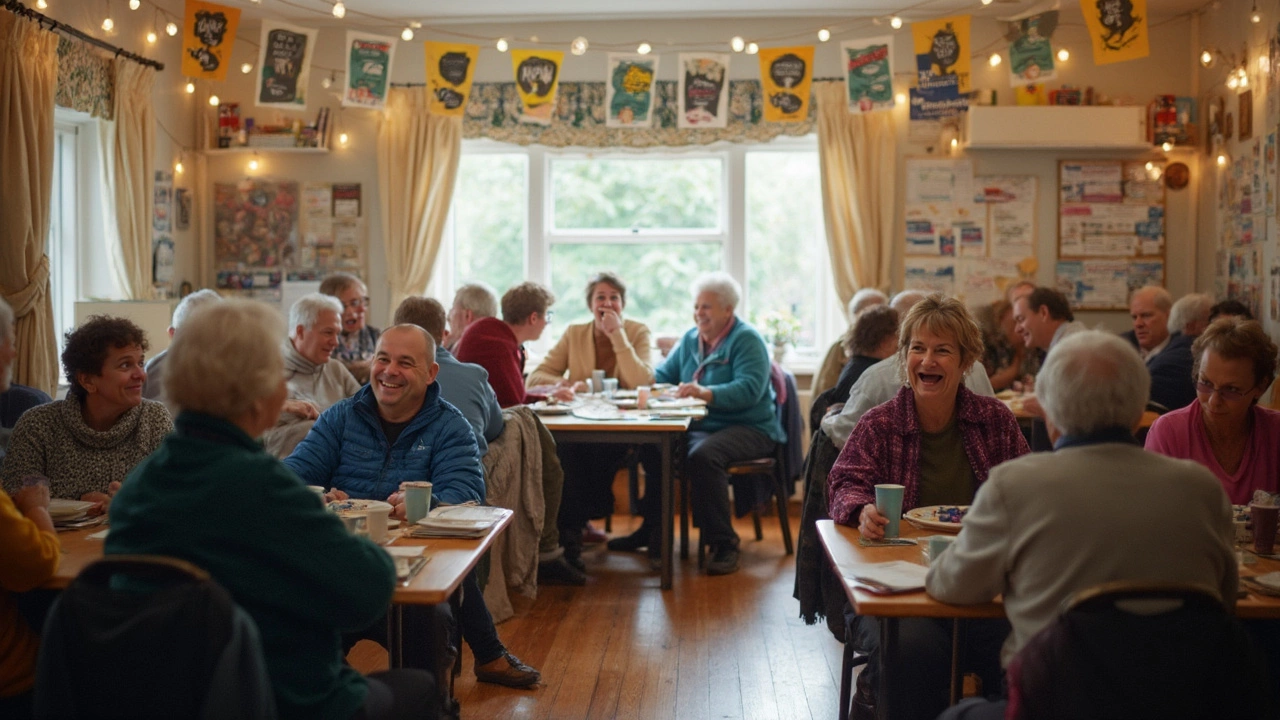Ever searched for a 'support group' but came up with nothing interesting nearby? That’s not because there aren’t any—it’s just that they don’t always go by that name. You might spot names like ‘peer support group,’ ‘self-help group,’ or even just ‘community group’ on flyers around town. Knowing these alternate names is a total game-changer if you want to find the right people to connect with.
Local groups come in all shapes and sizes. Some focus on sharing personal challenges, others are about getting practical advice, and some are simply for hanging out with folks going through the same stuff. The key is to recognize these different terms so you don’t miss out when searching online or asking around.
- Different Names for Support Groups
- Why Does the Name Matter?
- Types of Local Groups and What They Do
- Finding the Right Fit for You
- Tips for Getting the Most Out of Your Group
Different Names for Support Groups
If you’ve ever found yourself typing “support group” into Google or scanning community bulletin boards, you might notice that what you’re looking for often hides under a bunch of other names. The same thing can be called a self-help group, peer support group, or even a community group depending on where you live or what you’re dealing with. Sometimes, organizations just want to sound more inviting or less intimidating, so the labels change but the idea stays the same: connecting folks facing similar challenges.
Here’s a quick look at some of the names you’re most likely to spot, and what they usually mean:
- Peer support group: Heavy on sharing personal experiences with others facing similar situations. Think folks coping with grief, addiction, or new diagnoses.
- Self-help group: Focused more on practical advice and strategies, often for things like weight loss, anxiety, or quitting smoking. It’s more DIY with group backup.
- Community group: Broader term—could be social, educational, or even activity-based, but almost always about bringing people together locally.
- Mutual aid group: Usually more grassroots, these groups often involve trading support or resources among members.
- Recovery group: Specific to challenges like addiction or mental health recovery, these follow certain programs like the famous 12-step style.
You might even come across support circles, healing groups, wellness collectives, and more. Honestly, the list keeps growing as people find new ways to connect and support each other in their lives.
| Group Name | Common Focus |
|---|---|
| Peer Support Group | Shared life experiences |
| Self-Help Group | DIY advice, practical help |
| Community Group | Local connection, socializing |
| Mutual Aid Group | Exchange of support/resources |
| Recovery Group | Addiction or mental health recovery |
If you feel stuck searching, try these names in your search bar. You might be surprised just how many local groups are out there, waiting to welcome you in.
Why Does the Name Matter?
This might surprise you: the name of a support group actually makes a big difference. When you’re hunting for help, searching by the wrong name might mean you miss out on something that’s perfect for you. For example, a flyer might say “peer support circle,” or “self-help group”—two names that sound casual but mean the same thing as a classic support group.
Crazy enough, an article from the U.S. Department of Health & Human Services says people who use specific search terms like “peer support” or “community group” are twice as likely to find groups that fit their needs than those who only search with one phrase. That’s a big leap just by switching up your wording!
Sometimes, the name also hints at what goes on inside. Here’s a quick rundown:
- Support group: Usually focused on sharing personal stories and offering encouragement.
- Peer support group: Centers around people with shared experiences helping each other.
- Self-help group: Leans a bit more toward learning and skill-building along with sharing.
- Community group: A broader name that can include fun activities, learning, and emotional support.
The right keyword can crack open a whole new world of options. Some local groups don’t even use the word “support,” which can throw off your search if you’re not looking for synonyms. Your best bet? Try out different keywords (‘peer support’, ‘self-help’, or even your city’s name plus ‘group’). Chances are, you’ll hit on the kind of group that actually fits your vibe.

Types of Local Groups and What They Do
There’s actually a huge variety when it comes to local support group types. Some are super structured—think regular meetings, a set plan, and maybe even a professional leading the way. Others feel more like casual hangouts where people drop in, chat, and swap stories. Both can make a big difference depending on your comfort zone.
Here are some of the main types you’ll come across when searching for a peer support group or community group in your area:
- Self-help groups: These are often run by people dealing with the same stuff you are—whether it’s coping with loss, managing addiction, or living with a medical condition. Super common examples are Alcoholics Anonymous and Narcotics Anonymous.
- Peer-led groups: No professionals here. It’s usually just folks supporting each other through shared experience. These groups often have flexible structures and focus on open sharing.
- Therapist-led groups: Sometimes called group therapy, these local groups are guided by counselors or psychologists. You get professional advice mixed with peer connection.
- Online or hybrid groups: Believe it or not, plenty of ‘local’ support group options meet online now but still keep things focused on your specific community or city. Perfect for when you can’t leave the house or feel more comfortable behind a screen.
- Activity-based groups: Not every group is about sitting in a circle. Some connect over crafts, outdoor walks, or even cooking classes—just as much ‘therapy’ happens when you’re busy doing something together.
What’s interesting: A recent survey by Mental Health America found that 67% of people in peer-led groups felt their overall well-being improved, compared to 45% for those in more traditional therapy-led settings. It shows how valuable that sense of community can be.
Finding the Right Fit for You
So you’ve figured out all the sneaky names a support group might use. That’s the first step. Next up: finding one that actually clicks with you. There’s no magic formula, but a few tips can make the search way less awkward.
First off, list out what you want. Are you struggling with a specific issue, or just looking for folks who “get it”? For example, some peer support groups zero in on mental health, addiction, or caregiving, while others are broader, like community walking groups or local meetups focused on single parents. The closer the group's focus is to your own concerns, the better the odds you’ll feel understood.
- Check out websites like Meetup.com, local hospital bulletin boards, or your city’s community center site—groups don’t always call themselves “support group.”
- Don’t be shy about emailing or calling the group leader. Ask how big the group is, if it’s online or in-person, and what a typical meeting looks like.
- Drop by as a guest before committing. Most groups have no problem letting newcomers sit in for a session or two. You’ll know pretty quickly if you vibe with their style.
- Be open to trying a couple groups. Sometimes the first group you pick isn’t the best fit, and that’s totally normal.
Here’s a little snapshot of what people commonly search for when looking for groups, just so you know you’re not alone:
| Search Term | Monthly US Searches (2024) |
|---|---|
| support group | 49,000 |
| peer support group | 8,100 |
| self-help group | 6,700 |
| community group | 2,400 |
If you’ve already got a few groups in mind, jot down how you felt after checking them out—did you feel heard? Did folks seem welcoming? Sometimes, the vibe matters just as much as the topic.
You deserve a group that works for you. There’s no shame in moving on if it’s not the right fit. With a little patience (and maybe some trial and error), you’ll land in a place where you actually feel supported.

Tips for Getting the Most Out of Your Group
If you’re taking time to join a support group, you totally want it to help, right? Here’s how to squeeze real value out of these meetups, whether you’ve found a local group or connect online.
- Show up consistently. People open up more and get better advice when they know who’s in the room. Regulars build trust fast—you don’t have to share right away, but sticking around matters.
- Set a small personal goal. Maybe it’s just introducing yourself, or asking a question every session. Little wins add up and make you feel more involved.
- Respect privacy. Most peer support and self-help groups run better when everyone keeps stories confidential. Don't spill what you hear elsewhere—people will do the same for you.
- Take notes. Jotting down tips or book recommendations beats trying to remember everything. You’ll be surprised how much useful stuff comes up.
- Offer support as well as ask for it. Helping someone else makes you feel stronger. You don’t need to solve anyone’s problems—just listening or sharing that you get what they’re going through is enough.
- Look for special sessions. Some community groups invite guest speakers or run fun social events. These can break up the routine and lead to new ideas or friends.
Did you know around 80% of people who join a support group leave feeling more hopeful about their situation? This is especially true for smaller, local groups where it’s easier to form connections. Here’s how people say support groups help them most:
| Benefit | Percentage of Members Reporting It |
|---|---|
| Feeling understood | 82% |
| Learning practical tips | 76% |
| Less isolation | 74% |
| Improved coping skills | 65% |
Sometimes it takes a couple of tries to find a group where you really click. Don’t give up if the first one doesn’t fit—there’s a lot out there, each with their own vibe. Bring your real self, and you’ll be surprised what you—and others—can get out of it.
